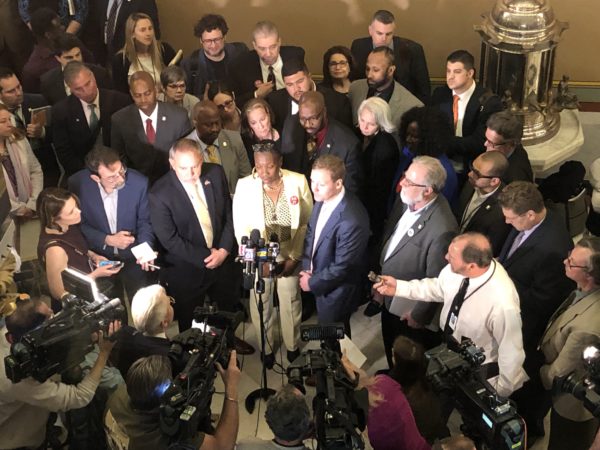Marathon Debate, then House Vote for $15 Minimum Wage

Audio By Carbonatix

Democratic leaders answered questions from the media following the House vote to institute a minimum wage hike. Photo credit: Jenna Carlesso, CTMirror.org
Members in Connecticut’s House of Representatives spent an all-nighter in the chamber, before passing a minimum wage bill late Thursday morning.
By Mark Pazniokas, CTMirror.org
Democrats and Republicans sharply split in an overnight debate over whether raising Connecticut’s $10.10 minimum wage to $15 over four-and-a-half years would be an overdue lift to low-wage workers or an ill-considered blow to small businesses in a state that has yet to fully recover from the Great Recession of 2008.
By a vote of 85-59 on Thursday, the Democratic majority in the House of Representatives passed and sent to the Senate what would be the first minimum-wage bill passed by the General Assembly since March 2014. It includes five raises, none exceeding $1, that would increase the hourly minimum by 90 cents to $11 on Oct. 1 and reach $15 on Oct. 15, 2023.
Over the course of a debate that limped into its 13th hour after 10 a.m., Democrats and Republicans viewed and interpreted the minimum wage from opposite sides of a wide cultural, racial, social, and political gulf.
On one side, Democrats saw the the minimum wage as a badly needed corrective to an economy that increasingly traps adults in low-wage jobs with little chance of advancement. On the other, many Republicans said they still see minimum-wage jobs as a young person’s entry to the world of work and a higher mandated wage as a potent threat to Connecticut economy that has not seen economic growth in more than a decade.
They lectured each other on economics and economic equality.
House Majority Leader Matt Ritter, D-Hartford, said after the vote that the minimum wage underscores the differences between the parties, and he suggested that the unanimous GOP opposition should cost the party in some of blue-collar strongholds, where President Trump ran well in 2016. Two Democrats, Pat Boyd of Pomfret and Chris Ziogas of Bristol, voted with the GOP.
“There was this argument after the elections about who represents blue-collar workers and blue-collar voters, right? When you talk about not just inner cities, but Naugatuck Valley, eastern Connecticut, where you have poverty, where you have people who need to make more money to provide for their families,” Ritter said. “Well, today was a big vote to test that.”
House Minority Leader Themis Klarides, R-Derby, demurred, downplaying the significance of a party-line vote, even one preceded by a grueling 14-hour debate.
I don’t think it sharpens the differences at all,” Klarides said. “I think we go back on Tuesday and start debating other bills. Two days ago, we all came together on a gun bill, which hasn’t happened since I don’t know when.”
If nothing else, the debate reinforced that elections have consequences.
Gov. Ned Lamont, a Democratic businessman, ran last year on a promise to raise the minimum wage to $15, as did many Democratic candidates for the General Assembly. Democrats made their first legislative gains in a decade, and they now have majorities of 90-50 in the House (with a 91st member, the winner of a special election, arriving soon) and 22-14 in the Senate.
With no chance of reconciling those inter-party differences, the final shaping of the bill was an internal matter for Democrats, who hustled Wednesday to resolve differences between the House and Senate and liberals and moderates. Last-minute negotiations with Senate Democrats over revisions designed to bring moderate Democrats on board delayed the start of the House debate until a few minutes after 10 p.m.
Senate President Martin M. Looney, D-New Haven, said a compromise struck with the House Democratic leadership would result in a slightly longer path to $15 than the four years sought by Lamont, who was cross-endorsed by the union-funded Working Families Party.
The four-year version would have raised the minimum by $1.15 to $11.25 in January, followed by increases of $1.25 in each of the following three years until reaching $15 on Jan. 1, 2023. Looney said the moderates in his party wanted no annual increase to exceed $1.
The new version would bring the minimum to $11 on Oct. 1, $12 on Sept. 1, 2020, $13 on Aug. 1, 2021, $14 on July 1, 2022 and $15 on Oct. 15, 2023. It would require the governor and legislature to consider freezing the wage if the economy sours.
After 2023, the minimum wage would be pegged to the Employment Cost Index, a measure of wage growth calculated by the federal Bureau of Labor Statistics.
But Republicans argued that the compromise still was too burdensome to business.
“It’s too soon, too fast, too much,” said Rep. Joe Polletta of Watertown, the ranking House Republican on the Labor and Public Employees Committee. “The small-business community has come out in strong opposition to this.”
Polletta, the vice president of a family-owned real estate business and a convert to the Republican Party, said Connecticut’s economy is too fragile for a minimum wage increase. As a Democrat running for the House in 2014, Polletta supported a $15 minimum wage as he sought and obtained the cross-endorsement of the Working Families Party.
“Since then, I’ve evolved,” he said outside the House chamber.
Not all businesses were opposed. Scott Dolch, the executive director of the Connecticut Restaurant Association, said his members were pleased that the bill would not raise the $6.38 minimum wage for tipped workers.
The all-nighter in the House was a one-sided debate in which a choreographed lineup of Republicans proposed amendments and posed questions to the lead sponsor, Rep. Robyn Porter, D-New Haven, the co-chair of the Labor and Public Employees Committee, long a flash point for debates over questions of economic growth vs. economic justice.
“This has been a long time coming,” Porter said of the debate, wearing a red $15 button on the lapel of her yellow jacket.
Ritter, whose position as majority leader gives him the right to the last word in debates, recognized Porter’s long night and day of explaining and defending the bill by yielding his time to her. She rose as the clock ticked towards noon.
“It’s been a long, hard struggle, and I’m not just talking about this debate,” said Porter, a single mother who says she can readily identify with everyone who struggles financially. Fifteen dollars is not a living wage, but she said, “It is a step forward.”
Five hours earlier, Rep. Joseph Zullo, R-East Haven, who flipped a blue-collar seat long held by Democrats in a special election this year, complimented Porter for her stamina and commitment for defending the bill over nine hours, while calling its contents wrong-headed.
Porter and the few other Democrats who rose to speak in the early hours of the debate called the minimum-wage increase a modest step toward helping working families towards a living wage. Rep. Mary Mushinsky of Wallingford, the longest-serving member of the House, said just paying for adequate housing in her district requires a single worker to earn $24 an hour or a couple $12 each.
To Republicans, it would be a job-killer.
Klarides, whose district stretches from the Naugatuck Valley town of Derby to the upscale New Haven suburb of Woodbridge, said everyone can debate the impact of a minimum-wage increase, but not the fact that Connecticut’s economy is struggling, largely missing the recovery that has lifted other states.
“That is data,” Klarides said. “That is pure, unadulterated data.”
Rep. Vincent Candelora, R-North Branford, who owns the Connecticut Sportsplex, said he would have to lay off full-time adult workers to pay the higher minimum to his part-time student employees. The bill allows employers to pay 16- and 17-year-old employees a lower wage for up to 90 days, a provision Candelora called insufficient.
A majority of workers paid the federal minimum of $7.25, a rate exceeded by the state minimums of every northeastern state except New Hampshire, are young and part-time workers, according to the Bureau of Labor Statistics. But advocates of a $15 minimum say the picture in Connecticut and other states with higher minimums is far different.
“The typical minimum-wage worker is female and approaching middle age,” said Rep. Christine Palm, D-Chester, who was a policy analyst on women’s issues before joining the House. They aren’t unionized and have few protections other than the minimum wage, she said.
Palm said the image of minimum-wage jobs as entries to the workforce and springboards to advancement are largely a myth: Only five percent advance to a higher wage in a year.
Research by the Economic Policy Institute indicates that 57 percent of minimum-wage workers overall are full-time employees, 37 percent are 40 or older, and 28 percent have children. Rep. Josh Elliott, D-Hamden, the owner of two natural food stores, said the buying power of the minimum wage peaked in the 1970s, and it would be $21 today had it kept pace with inflation.
Rep. Arthur O’Neill, R-Southbury, conceded that a larger segment of the workforce is struggling to reach “the ladder of success.” But his conclusion was that a higher minimum wage would eliminate the first rung on that ladder, harming the workers the bill is intended to benefit by once again branding Connecticut as hostile to business.
“It’s a signal and a symbol,” O’Neill said.
He was one in a procession of Republicans who rose to highlight the costs of a higher minimum wage to non-profit agencies and municipalities, among others. Democrats countered by saying it would grant raises to 332,000 minimum-wage workers. In one Hartford district alone, the bill would mean a raise for 4,330 constituents, Porter said.
“If our economy doesn’t work for everyone, then it doesn’t work. It’s that simple,” Lamont said in a statement issued after the vote.
At a public hearing in March, few witnesses defended the sufficiency of the current wage, which yields an annual income of $21,000 to someone who works 40 hours a week, 52 weeks a year. Once the region’s highest, the state’s minimum is lower than the wages in New York, Massachusetts, Rhode Island, Vermont and Maine.
The 2014 minimum wage law raised a $8.70 minimum wage – then the second-highest in New England and fourth-highest nationally – to $9.15 in 2015, $9.60 in 2016, and $10.10 in 2017.
With an 18-18 tie in the Senate in 2017 and 2018, Democrats were unable to pass a raise, but they won solid majorities in both chambers last fall. One of the 18, Sen. Joan V. Hartley, D-Waterbury, blocked passage in the previous term by withholding her support.
On Wednesday, Hartley said she would not vote for the current bill unless it is amended to stretch out the implementation schedule to six years. But Hartley no longer has a veto. Her defection this year still leaves 21 potential Democratic votes in the Senate.
Reprinted with permission of The Connecticut Mirror. The author can be reached at [email protected].
Like what you see here? Click here to subscribe to We-Ha’s newsletter so you’ll always be in the know about what’s happening in West Hartford!



